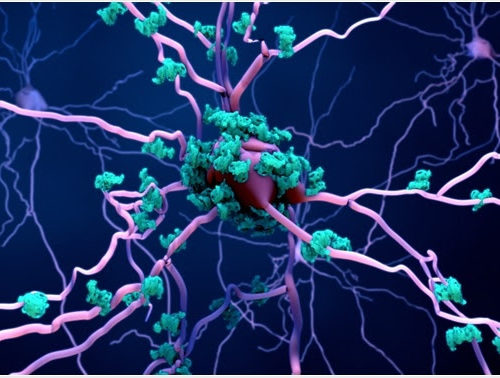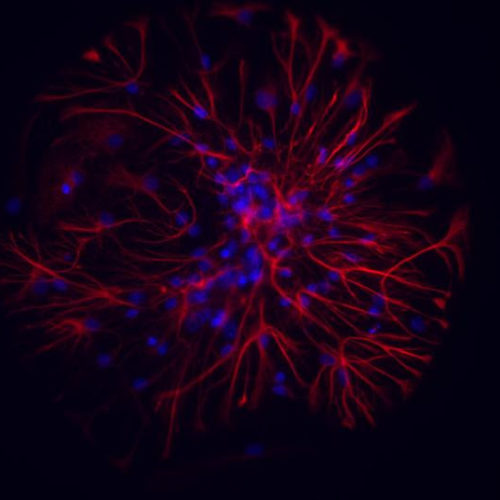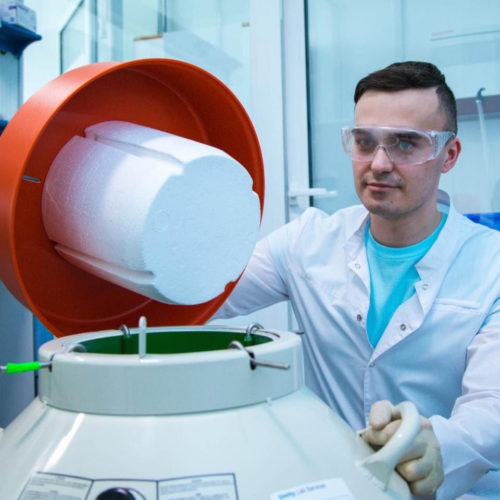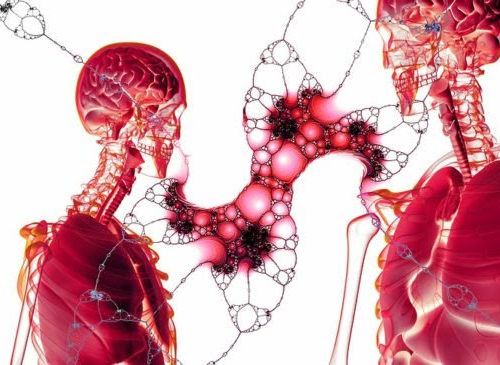By Christy Cheung, MRes Neuronal cell death in the nervous system is a major contribution to neurodegenerative diseases. Despite occasional neuronal deaths during the process of aging, extensive neuronal cell death is rare in adults with a mature central nervous system (CNS). Nevertheless, there is an increased neuronal loss in patients with neurodegenerative diseases compared...
Tag: <span>cell death</span>
Gold nanoparticles to save neurons from cell death
Published on ACS Nano, journal of the American Chemical Society, the study opens important perspectives for treatment of diseases such as Alzheimer’s and Huntington’s disease, but also epilepsy, brain trauma and stroke. NEURONS AND ATROCYTES UNDER A FLUORESCENCE MICROSCOPE view more CREDIT: IIT-ISTITUTO ITALIANO DI TECNOLOGIA Lecce, 25th June 2020 – Gold nanoparticles have been...
Gold nanoparticles to save neurons from cell death
Published on ACS Nano, journal of the American Chemical Society, the study opens important perspectives for treatment of diseases such as Alzheimer’s and Huntington’s disease, but also epilepsy, brain trauma and stroke. ISTITUTO ITALIANO DI TECNOLOGIA – IIT CREDIT: IIT-ISTITUTO ITALIANO DI TECNOLOGIA Lecce, 25th June 2020 – Gold nanoparticles have been developed in the...
Scientists found out how nanoparticles kill cancer cells
In the authors’ opinion, this research will help to treat oncology IMMANUEL KANT BALTIC FEDERAL UNIVERSITY CREDIT: IMMANUEL KANT BALTIC FEDERAL UNIVERSITY Scientists from the Immanuel Kant Baltic Federal University (IKBFU) and National University of Science and Technology “MISiS” have studied how magnet nanoparticles affect cancer cells in the human liver. In the authors’ opinion,...
Silicones may lead to cell death
by Radboud University Nijmegen Silicone molecules from breast implants can initiate processes in human cells that lead to cell death. Researchers from Radboud University have demonstrated this in a new study published on 12 June in Scientific Reports. “However, there are still many questions about what this could mean for the health effects of silicone...
‘Cells-Soldiers’ Turned to Be More Resistant Than ‘Cells Combat-Medics’
Researchers from Sechenov University (a Project 5-100 participant) and University of Pittsburgh (USA) discovered that the resistance of innate immune cells, macrophages, to ferroptosis – a type of programmed cell death – depends on the type of their activation. It turned out that cells helping tissues to recover from inflammation were more vulnerable. The researchers...
How trans fats assist cell death
Some trans fats enhance a pathway inside the cell that leads to cell death; drugs targeting this mechanism could help address diseases associated with these fats TOHOKU UNIVERSITY Tohoku University researchers in Japan have uncovered a molecular link between some trans fats and a variety of disorders, including cardiovascular and neurodegenerative diseases. Their findings, published...
Bacteria can ‘outsmart’ programmed cell death
UNIVERSITY OF COLOGNE Certain bacteria can override a defence mechanism of the immune system, so called programmed cell death, through inhibition of death effector molecules by their outer membranes components. Shigella bacteria, which cause diarrhoea, use lipopolysaccharides (LPS) on their surface to block the effector caspases. Lipopolysaccharides are a component of the bacterial outer membrane....
A powerful cell-protection system prevents cell death by ferroptosis
The discovery of a mechanism that guards against a type of cell death celled ferroptosis reveals a system that regenerates a ubiquitous protective component of biological membranes, and might offer a target for anticancer drugs. Brent R. Stockwell On 3 December 1956, the biochemist Frederick Crane detected, for the first time ever, a yellow substance...
A compound effective to chemotherapy-resistant cancer cells identified
HOKKAIDO UNIVERSITY A compound effective in killing chemotherapy-resistant glioblastoma-initiating cells (GICs) has been identified, raising hopes of producing drugs capable of eradicating refractory tumors with low toxicity. Despite longstanding and earnest endeavors to develop new remedies, the prognosis of most glioblastoma patients undergoing chemotherapies and radiotherapies remains poor. Glioblastoma, a malignant glioma, has a median...
- 1
- 2





